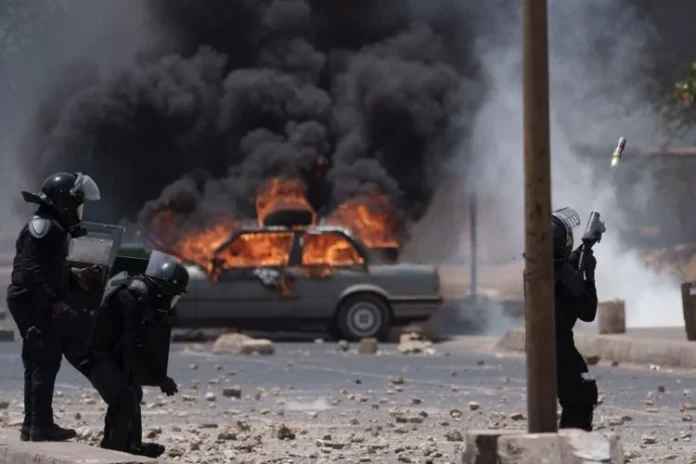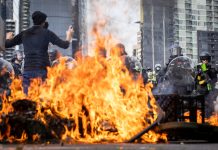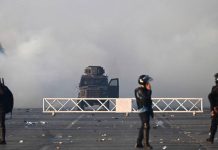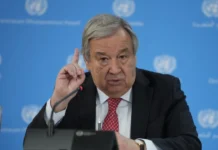DAKAR, Senegal (AP) – Nine people have been killed in clashes between police and supporters of Senegalese opposition leader Ousmane Sonko, the government said. Authorities have banned the use of several social media platforms in the wake of the violence.
Interior Minister Antoine-Félix Abdoulaye Diome said in a statement that the deaths occurred mainly in the capital Dakar and Ziguinchor in the south, where Sonko is mayor.
He said some social media sites such as Facebook, WhatsApp and Twitter, which demonstrators use to incite violence, have been blocked.
“The State of Senegal is taking all measures to ensure the security of its people and property. Sonko was found guilty Thursday of accepting bribes from young people, but was acquitted of charges of raping and threatening to kill a woman who worked at a massage parlor. The court sentenced Sonko to two years in prison. He did not attend the trial in Dakar and was convicted in absentia. His attorney said no arrest warrant had been issued against the politician.
Sonko came third in the 2019 Senegalese presidential election and is popular with the country’s youth. His supporters say his legal troubles are part of a government effort to cancel his candidacy for the 2024 presidential election.
Sonko is seen as a major rival to President Mackey Sall, who has urged Sall to publicly say he is not seeking a third term.
Since the ruling, clashes have erupted across the country, with demonstrators throwing rocks, setting vehicles on fire and building barricades in some places as police fired tear gas. Rising black smoke and the sound of tear gas firing were seen and heard throughout the city.
The clash forced the closure of Dakar’s main university. On Friday, Associated Press reporters saw students with bags over their heads rushing off campus and walking past the wreckage of burnt-out cars.
“Students are to blame for the vandalism and the government is to blame for the situation in the country,” Sario Beve said.
A 25-year-old master’s student said it was the second time the university had been closed due to Sonko-related protests. At least 14 people were killed in clashes in 2021 when authorities stopped Sonko on her way to college for obstruction. He said that public order arrests court hearings, but this time it’s even worse.
“Buses were also damaged, and the government was also damaged. The classroom was damaged. There was a lot of vandalism, which was unfortunate,” he said.
Bewe said he will take the exam in 10 days, but he doubts he will be able to pass it.
Security forces patrolled the streets on Friday and guarded some supermarkets and shops in anticipation of further riots.
Human rights groups have accused the government of crackdowns, including arbitrary arrests and restrictions on social media.
“These restrictions on freedom of expression and information are arbitrary measures contrary to international law and cannot be justified on security grounds,” Amnesty International said in a statement.
In Senegal, youth corruption, such as using a position of power to have sex with people under the age of 21, is a crime punishable by up to five years in prison and fines of up to $6,000 or more.
Under Senegalese law, his conviction would prevent Sonko from running for election next year, said another lawyer, Bamba Cisse.
“Because he was convicted in absentia, the juvenile corruption conviction cannot be appealed because it affects his eligibility,” Cisse said.
But the government said Sonko could request a retrial after being imprisoned. It is unclear when he will be taken into custody.
“The ruling demonstrates that the Sal government is using the judiciary as a weapon to remove a prominent rival who is destabilizing its rule,” said Mukhahid Durmaz, senior analyst at global risk intelligence firm Verisk Maplecroft.
“While the Sonko case has been touted as a beacon of democracy, it illustrates the systemic problems facing Senegal. It will raise strong criticism of the erosion of judicial independence and the retreat of democracy,” Dumas said.
Government spokesman Abdu Karim Fofana said the damage caused by the months-long demonstrations cost the country millions of dollars. “These calls are hidden behind the shadows of social networks and the anti-republicanism of all these movements that don’t believe not only in democratic basics like elections and free speech, but also in the resources they provide.






